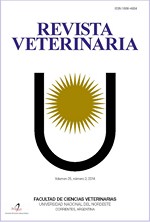Fructooligosaccharide, Cynara scolymus dry extract and choline chloride as dietary supplements in broilers chickens breeding (Gallus gallus)
DOI:
https://doi.org/10.30972/vet.3416609Keywords:
Broilers chickens, prebiotics, proteins, body weight, aminotransferaseAbstract
Prebiotics are defined as non-digestible food ingredients that produce beneficial effects to the host. In this study, the balanced food of broiler chickens was supplemented for two different prebiotics: Fructooligosaccharide (FOS) and Cynara scolymus (Artichoke) dry extract plus Choline chloride (EA + Choline) in order to evaluate their effects. We worked with 198 newborn broiler chickens of the cobb line. For the trials, they were divided into three groups: two experimental and one control (L3). One experimental group was supplemented with FOS (L1) and the other with (L2). Daily mortality records were kept. At 7 and 14 days of breeding, 6 randomly selected animals from each group were slaughtered. The remaining animals were sacrificed at 45 days of age. Individual body weight (PC) was obtained before slaughter. In the slaughter of 14 and 45 days, the bursa of Fabricio and the spleen were extracted and weighed. During the last slaughter, 6 to 8 chickens from each group were randomly selected to obtain plasmas, in order to quantify total proteins, protein electrophoresis and AST and ALT transaminases. Data presented as mean ± S.D, were analyzed using one-way analysis of variance (ANOVA) and Tukey’s multiple comparison test. Data analysis was performed using Graph Pad Prism 8.0.1 and results were declared significant at p<0.05. Regarding the control group, it was observed that the two prebiotics improved the breeding of the birds, although not in significant values. More research is necessary in order to verify the benefit of the use of the prebiotics FOS and EA + Choline, to improve the characteristics of the broiler chicken and achieve maximum performance.
Downloads
Downloads
Published
How to Cite
Issue
Section
License
Revista Veterinaria (Rev. Vet.) maintains a commitment to the policies of Open Access to scientific information, as it considers that both scientific publications as well as research investigations funded by public resources should circulate freely without restrictions. Revista Veterinaria (Rev. Vet.) ratifies the Open Access model in which scientific publications are made freely available at no cost online.











.jpg)
.jpg)



